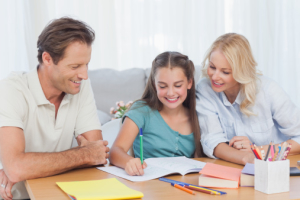 Being a parent is the most rewarding and demanding job you’ll ever have. It’s important to learn as much as you can about your child and which parenting methods work best because children are like snowflakes; there are no two alike. If your child has been diagnosed with ADHD, your parenting skills may need a bit of adjustment. Here are 5 parenting strategies to help you be the best parent you can be to your child with ADHD.
Being a parent is the most rewarding and demanding job you’ll ever have. It’s important to learn as much as you can about your child and which parenting methods work best because children are like snowflakes; there are no two alike. If your child has been diagnosed with ADHD, your parenting skills may need a bit of adjustment. Here are 5 parenting strategies to help you be the best parent you can be to your child with ADHD.
1. Know the difference between discipline and punishment
Discipline and punishment are two vastly different things. Discipline teaches the child how to behave by explaining the inappropriate behavior, redirection to the acceptable behavior and includes positive reinforcement for good behavior. Punishment, however, uses shame and fear to force the child to behave in a certain way. While punishment has its place, it should never involve physical or verbal abuse.
Children with ADHD may not respond well to the typical types of discipline, such as taking away privileges, time outs, and so on. Perhaps the best way to discipline a child with ADHD is to create a program of behavior modification. You need to define age-appropriate goals that are realistically attainable and then reward your child’s positive behavior. By rewarding positive behavior, you’re helping your child feel successful and further increasing his/her motivation to behave appropriately.
2. Medication is not king
For many children with ADHD, the right medication can make all the difference in his/her behavior. However, medication is not the only thing to positively affect behavior. Be sure not to place a high importance on your child’s medication so that your child can feel responsible for his/her behavior. Do not ask your child if he/she took their medication and never threaten to increase the dosage as a result of inappropriate behavior.
3. Pay more attention to positive behavior
There’s an old adage: “When I do right, no one ever remembers. But, when I do wrong, no one ever forgets.” This is especially important for parents of children with ADHD. While inappropriate behavior is part of ADHD, it’s important to pay more attention to your child’s positive behavior. Catch your child doing something positive and praise him/her for it.
4. Learn to anticipate situations
Pay close attention to situations that can potentially be explosive to your child. It’s important to be a proactive parent instead of a reactive parent. Making a plan can help you and your child know what is acceptable behavior, what the consequences are if your child does not exhibit that behavior, and how it will be handled.
Being consistent is important for all children but it is especially important for children with ADHD. You and your spouse should be on the same page with regards to your child’s behavior and discipline. Presenting a united front shows your child exactly what to expect from each of you.
5. Accept that your child is not perfect
There is no one perfect person walking the Earth and this includes your child, ADHD or not. As a parent, you are responsible for making your child feel accepted and supported. Look at the positive side of ADHD such as, exceptional energy, creativity, and interpersonal skills. Nurture these things in your child and watch he/she shine!
Dr. Amanda Itzkoff is trained in Psychotherapy and Psychopharmacology in New York, and can help you move beyond the frequent frustrations or limitations that may be caused by adult ADHD/ADD. If you are looking for more information on adult ADHD, please feel free to contact us via email. To schedule a consultation, please contact our office at 917-609-4990.
Be well,
Dr. Amanda Itzkoff

